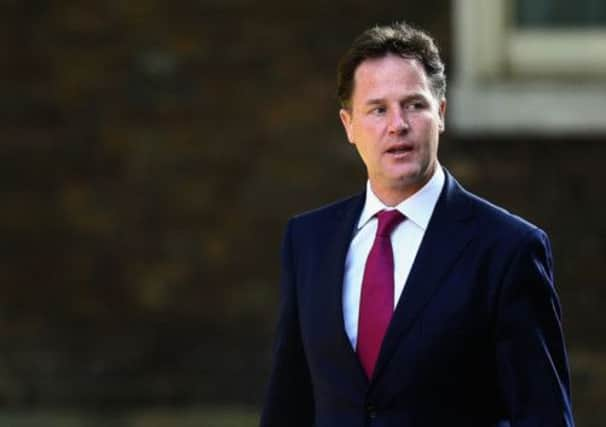Scottish independence: Clegg calls on businesses


Nick Clegg made his appeal during an address to the Confederation of British Industry annual dinner in Glasgow last night.
“You drive the Scottish economy. You create the jobs and the wealth that makes Scotland a great place to live and work,” he said.
Advertisement
Hide AdAdvertisement
Hide Ad“I urge businesses across Scotland to remain a voice of reason in this debate, relentless in securing honest answers about the choice Scotland has to make.”
He repeated the Liberal Democrat promise that a vote against independence next September will lead to further powers for Holyrood.
“A vote against leaving the UK family is a positive vote to remain within it, and to be part of Scotland’s evolving position within it,” he said.
“We can’t let this debate be set up as a false choice between separation on the one hand and a status quo set in tablets of stone on the other. Because the more pragmatic reality is, and which business accepts, is that nations must adapt and evolve.”
As well as intervening in the independence debate, the Lib Dem leader promoted the case for a high-speed rail link connecting London to the north of England.
The railway intends to link London and Birmingham and potentially in a later phase extend to Manchester and Leeds, both of which are more than 200 miles south of Glasgow and Edinburgh.
The controversial railway will slash journey times to Scotland, he said.
Addressing recent criticism of the proposal, he said: “It’s a pattern we see happening time and time again in this country. When a deal has been signed, the temptation to undermine it from the comfort of opposition can be too much for some politicians to resist. This clouds the debate and chips away at the consensus.
Advertisement
Hide AdAdvertisement
Hide Ad“But the alternatives they suggest, such as upgrading existing lines, aren’t viable answers. For example, the extra capacity created through the £9 billion upgrade of the West Coast Mainline has already been filled.
“We’ve tested our business case rigorously and we’re clear on what needs to be done to deliver this project on time and to budget. That is how Britain builds the infrastructure it needs, and that’s how we compete, as a 21st-century economy, with a modern transport system that works to make us stronger.”